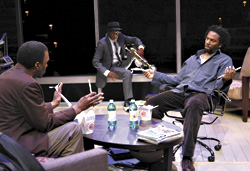In 1997, August Wilson engaged in a highly public and contentious debate with Robert Brustein, the Yale-based critic/director/playwright. The first point of disagreement was color-blind casting—minority actors in white roles—which Wilson considered patronizing, while Brustein, an early advocate for multiculturalism, thought was a useful way to get more roles for minority artists. The second was the failure of theater patrons and funders to support African-American companies—Brustein thought existing regional theaters could provide a home for artistically worthy black playwrights, while Wilson believed that until African-Americans ran these companies, the playing field was far from level.
Ten years on, color-blind casting is the norm across the country (partly because it remains popular with ethnic-minority artists), and here in Seattle at least, an all-black company has found a home on one of the mainstages.
A few years ago, local director Valerie Curtis-Newton and ACT’s artistic director Kurt Beattie negotiated a partnership whereby ACT would provide its stage and various other resources to a new African-American theater, the Hansberry Project, which would have independent creative control over the plays.
The company’s now in its third season and continues to work with texts that Curtis-Newton calls “lumpy.” “In mainstream theaters there’s a tendency to try and find the ‘perfect’ African-American play,” she says, “or at least a play by an author who’ll attract an audience, a Suzan-Lori Parks or one of August’s.” This climate isn’t very supportive of mid-career writers like Michael Bradford, author of Hansberry’s current play, Fathers and Sons, or of lesser-known plays that significantly influenced contemporary black playwrights and culture, like last year’s The Mojo and the Sayso. “If people don’t know [Mojo], they might think that Suzan-Lori Parks just sort of dropped out of the sky,” says Curtis-Newton.
It’s a given that an African-American company will approach a work by an African-American playwright with certain advantages of cultural insight, just as a Jewish director has a head start on a gentile when dealing with a play like Paddy Chayefsky’s The Tenth Man. But when I spoke to playwright Bradford, he said the quality of the artists is paramount, not the skin color. “An earlier play of mine—with nine black actors and all about black issues—was directed by a Jewish woman who’s as white as the day is long,” he recalls. “But she really took that play apart and put it back together again in a way that made it work.”
Black theater has a long history in Seattle. In the ’30s, the city hosted the critically acclaimed Negro Ensemble, a WPA project that was helmed and directed by whites but included some landmark productions—including a multi-race play about labor relations, Stevedore, and an all-black production of Sinclair Lewis’ It Can’t Happen Here. From 1969 to 1980 there was Black Arts/West, a company founded and operated by blacks, which in turn led to the creation of the Group Theatre, a multiethnic company that produced plays from the late ’70s until its demise in 1998.
The city’s strongest claim to black theatrical importance, of course, was the presence of Wilson, who moved to Seattle in 1990 and lived here until his death in 2005. But Wilson seemed to have little interest in the Seattle theater scene. True, the Rep is the only regional theater to have produced all ten plays in his “Pittsburgh” cycle, but Wilson always premiered them elsewhere, and his creative imagination remained in his hometown.
While Wilson would no doubt be proud and supportive of the Hansberry Project, I wonder what he’d make of the fact that the show’s audiences remain predominately white. On opening night of Fathers and Sons there were maybe a couple dozen blacks in a house that seats nearly 400. Curtis-Newton says she long ago accepted that as a Seattle artist, this would generally be the case. During previews of Fathers and Sons, she recalls, a white patron buttonholed her partner to complain that she couldn’t understand the black Southern dialect of one of the characters. “At the beginning of rehearsals, I often have to tell my actors ‘We have to find a compromise between the way we speak and what they can understand,'” Curtis-Newton says. But considering the effort she and the actor had made to make sure the lines were delivered clearly, she found herself thinking (though not saying), “Get over it.”
Shows performed by artists of color for a predominantly white audience run the risk of becoming a sort of exotic theme-park ride into a different culture, wearisomely pandering to the idea that “people are all the same” when you take away the “superficialities.” But with past productions, and certainly with Fathers and Sons, Curtis-Newton has stepped adroitly around this problem by producing plays that are conversations African-Americans are having with each other. Whites are given an insight into this world, but there’s no compromising on dealing with issues of specific importance to these people and this culture. It also helps that her eye for a stageworthy script is excellent; for a world premiere, Fathers and Sons is remarkably polished and effective.
Bradford himself admits to ambivalence toward cultural politics. He’s currently working on a play about the Spanish playwright and poet Federico Lorca and his assassination. But when he considers shopping his script around, he says he’s slightly worried about the reaction of some companies. “I worry I’ll show up with my Lorca play, and they’ll say ‘You better have a Spanish accent!'” he laughs.








